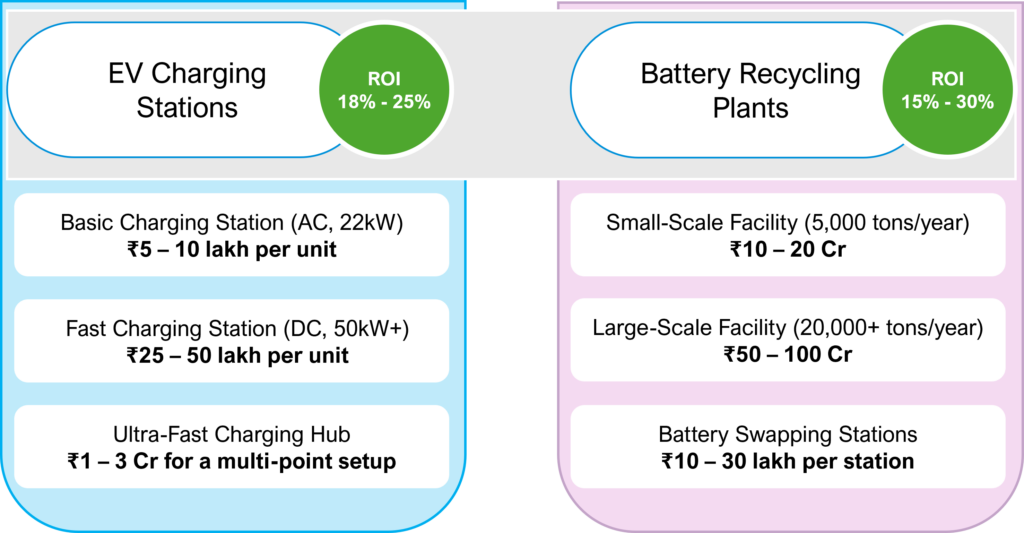EV Charging Station and Battery Recycling Opportunity Landscape

For entrepreneurs and investors looking to enter the EV Charging and Battery Recycling sector, understanding the market landscape is crucial. A well-prepared project report for EV charging station businesses can provide insights into feasibility, demand projections, and profitability. With India targeting 30% EV penetration by 2030 and an estimated demand for over 50,000 charging stations, now is the perfect time to explore opportunities in this space.
India’s electric vehicle (EV) market is experiencing unprecedented growth, driven by rising fuel costs, government incentives, and increasing environmental awareness. The Union Budget 2025-26 has reinforced this momentum by offering substantial support for the EV ecosystem, particularly in expanding EV charging infrastructure and battery recycling.
Market Overview and Growth Potential
The electric vehicle (EV) market in India is rapidly expanding, supported by government initiatives, rising fuel prices, and growing environmental consciousness. The Union Budget 2025-26 has provided strong incentives for:
- Expansion of EV charging infrastructure
- Development of battery recycling plants
- Strengthening the EV supply chain
Key Market Indicators:
- India targets 30% EV penetration by 2030
- Estimated demand for 50,000+ charging stations by 2030
- Battery recycling market to reach ₹10,000 crore by 2028
- Lithium-ion battery demand to increase 5x in the next decade
Given these projections, setting up an EV charging station is a lucrative business opportunity. However, preparing a project report for EV charging station setup is essential to assess location feasibility, investment requirements, and profitability.
Government Policies and Budgetary Support
Budget 2025-26 Incentives:
- ₹14,000 crore allocated for EV ecosystem development
- Tax breaks and subsidies for setting up charging stations
- PLI scheme for battery cell manufacturing
- Incentives for battery recycling technology R&D
- Reduced GST (5%) on EV components
These policies create an attractive environment for investment. A detailed project report for EV charging station businesses can help entrepreneurs understand the financial and operational aspects of leveraging these incentives.
Key Challenges and Risks
- High initial capital expenditure
- Land acquisition and regulatory approvals for charging hubs
- Power supply and grid infrastructure limitations
- Battery disposal and environmental compliance challenges
- Dependence on imported raw materials for lithium-ion batteries
To mitigate these risks, a project report for EV charging station businesses can provide a risk assessment and suggest viable solutions.
Implementation Roadmap
Short-Term (0-2 Years)
- Identify strategic locations for charging stations
- Secure government grants and private funding
- Set up pilot battery recycling projects
Medium-Term (2-5 Years)
- Scale up charging networks with partnerships (fleet, real estate, retail chains)
- Expand battery recycling operations and invest in automation
- Develop mobile and AI-driven energy management solutions
Long-Term (5+ Years)
- Establish battery material refining and reuse industry
- Integrate with renewable energy sources for sustainability
- Explore international markets for battery recycling and EV exports
Conclusion
The EV charging and battery recycling sector presents immense growth potential with strong government backing. Entrepreneurs and investors can capitalize on evolving policies, sustainability trends, and emerging technologies to build scalable, profitable businesses in the EV ecosystem.
Reach out to us by filling out the form to get a project report for EV charging station/feasibility study for EV battery Recyling plant done to start a business in this sector.
